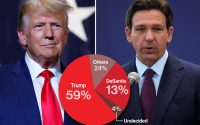Romney urges donors to push flailing candidates out of 2024 race
Sen. Mitt Romney (R-Utah) is begging GOP megadonors to help stop former President Donald Trump from easily clinching the party’s nomination in the 2024 race.
The 2012 Republican presidential nominee urged party powerbrokers to condition their donations on a demand that candidates promise to drop out and coalesce around the most viable anti-Trump contender by Feb. 26, 2024.
“There are incentives for no-hope candidates to overstay their prospects,” Romney wrote in a Wall Street Journal op-ed published Monday. “Left to their own inclinations, expect several of the contenders to stay in the race for a long time.
“They will split the non-Trump vote, giving him the prize.”
Romney’s clarion call comes as Trump, 77, not only has a plurality of support, but also a majority 33.3-point lead in the latest national RealClearPolitics polling aggregate.

Romney described the GOP field as being comprised of a “a baker’s dozen Republicans.”
But few of those candidates have publicly stipulated that their primary goal is to scuttle Trump from becoming the party standard bearer.
The Utah senator emphasized that the onus is on the donors.
“Donors may think that party leaders can narrow the field. Not so. Candidates don’t listen to party officials, because voters don’t listen to them either,” he wrote.
His proposed deadline of Feb. 26 for candidates with no shot at the nomination to drop out is days after South Carolina is slated to host its GOP primary, following the contests in Iowa, New Hampshire and Nevada.

Romney emerged as a forceful Trump critic in the 2016 election cycle, encouraging voters to get behind the most viable candidate in a given state, with the apparent aim of achieving a brokered convention.
Trump ultimately bulldozed his way through the field of 16 hopefuls.
Romney has since repeatedly assailed the former president’s character.
“Our party and our country need a nominee with character, driven by something greater than revenge and ego, preferably from the next generation,” he stressed in the op-ed.


